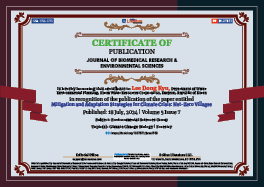Byung Chul An, Hwan Dong Seong and Dong Kyu Lee*
Volume5-Issue7
Dates: Received: 2024-04-11 | Accepted: 2024-07-17 | Published: 2024-07-18
Pages: 770-772
Abstract
To respond to the climate crisis, we are responding globally by setting the goal of Net Zero. These response strategies are being divided into mitigation and adaptation, but most studies emphasize the mitigation aspect, and research on this is the main focus. However, to respond to the climate crisis, adaptation aspects must also be considered, which may most closely affect changes and transitions in human life. Net Zero Villages is an implementation strategy to respond to the climate crisis and can be used in all aspects of mitigation and adaptation. In this study, Net Zero Villages Model was presented to help assess specific planning factors for Net Zero at the village level.
FullText HTML
FullText PDF
DOI: 10.37871/jbres1953
Certificate of Publication

Copyright
© 2024 An BC, et al. Distributed under Creative Commons CC-BY 4.0
How to cite this article
An BC, Seong HD, Lee DK. Mitigation and Adaptation Strategies for Climate Crisis: Net-Zero Villages. J Biomed Res Environ Sci. 2024 Jul 18; 5(7): 770-772. doi: 10.37871/jbres1953, Article ID: JBRES1953, Available at: https://www.jelsciences.com/ articles/jbres1953.pdf
Subject area(s)
References
- Rogelj J, Schaeffer M, Meinshausen M, Knutti R, Alcamo J, Riahi K, Hare W. Zero emission targets as long-term global goals for climate protection. Environmental Research Letters. 2015;10(10):105007. doi: 10.1088/1748-9326/10/10/105007.
- Park SH, Park CH. A study on the research methodology for village studies. Journal of the Korean Regional Development Association. 1993;5(2):71-90.
- Lee DK, An BC. Analysis of contribution to net zero of non-urban settlement: For green infrastructure in rural areas. The Korean Institute of Landscape Architecture. 2022;50(3):19-34. doi: 10.9715/KILA.2022.50.3.019.